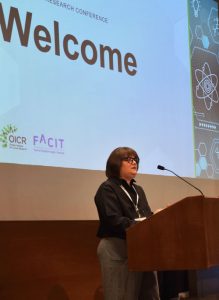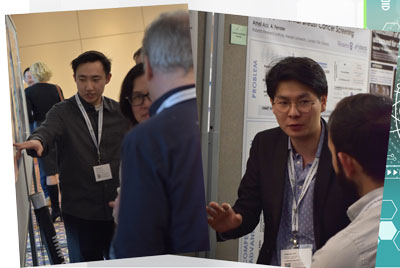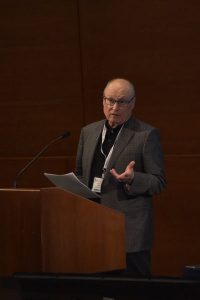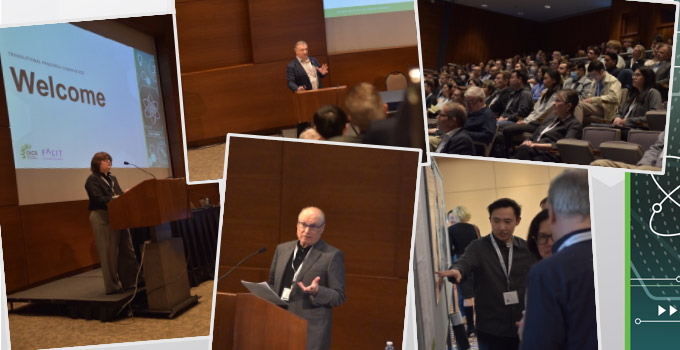Scientists, clinicians and patients shared their achievements and ideas for improving the lives of people affected by cancer.
For a moment, on stage in front of a crowd of accomplished cancer researchers from Ontario and beyond, Carla Bossart-Pletzer wondered if she belonged.

A designer and illustrator by trade, Bossart-Pletzer was serving as MC for OICR’s 2024 Translational Research Conference, a gathering of about 250 people from across OICR’s vast cancer research network.
“Then I remembered what my accomplishment is,” Bossart-Pletzer told the crowd. “My accomplishment is that I’m alive to be here – I’m surviving cancer.”
She said that her diagnosis of inflammatory triple negative breast cancer may have been a death sentence, if not for recent advances by cancer researchers.
“Thank you for what you’ve done and continue to do to give people like me a chance,” said Bossart-Pletzer, who has herself become a key contributor to cancer research as a member of OICR’s Patient and Family Advisory Council.
Bossart-Pletzer’s introduction set the tone the two-day conference – held March 26-27 in King City, Ont. – which showcased scientific innovations across many different disciplines, but was singularly focused on improving the lives of people affected by cancer.
The research presented at the conference took different approaches towards that goal. Some sessions covered new technologies for screening, diagnosing, monitoring and treating cancers, like liquid biopsy and novel targets for cancer drugs. Others focused on how to make research more accessible to diverse groups of people, and how to make sure promising research discoveries are implemented in the health system, where they can make a difference for patients.
The event was bookended by two impressive keynote speakers: Dr. George Kassiotis, a leading retroviral immunity researcher at The Francis Crick Institute, and Daphne Koller, CEO and founder of machine-learning driven drug discovery company insitro. And all conference sessions were co-facilitated by a person with lived experience of cancer, who helped to put the science into perspective.

The conference also put a spotlight on the next generation of scientists, including graduate students, postdoctoral fellows and early career researchers. Awards were handed out to the most exciting poster presentations by student researchers, including awards from the Ontario Rising Stars in Cancer Research Network and the new Acorn-2-Oak Commercialization Award from FACIT.
In his closing remarks, OICR President and Scientific Director Dr. Laszlo Radvanyi said the diversity of research presented at the conference is a testament to the infrastructure OICR has built. In addition to conducting and funding cutting-edge cancer research across the province, the Institute has helped make Ontario a global leader in genomics, liquid biopsy, genome informatics, artificial intelligence, radiopharmaceuticals, and other critical areas of cancer research.
“OICR is moving in the right direction. Let’s keep it up.”
Dr. Laszlo Radvanyi

PFAC Chair Terry Hawrysh applauded OICR’s emphasis on enabling early detection and intervention, while improving quality of life and reducing toxicities – outcomes he says matter to patients. He was also encouraged to see researchers focused on delivering these outcomes in an equitable and accessible manner.
“OICR is keyed in on the right things,” Hawrysh said. “I am walking away from this conference encouraged, with hope intact, and ready to roll up my sleeves and continue to work alongside you.”

